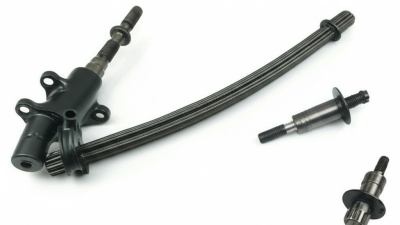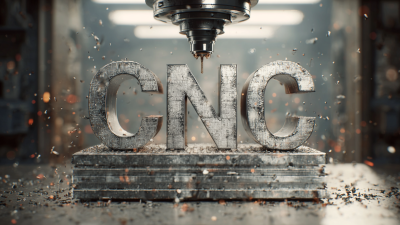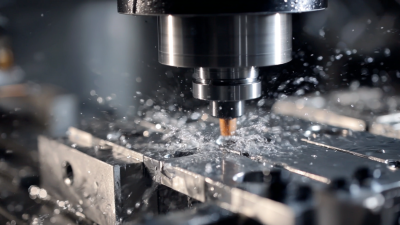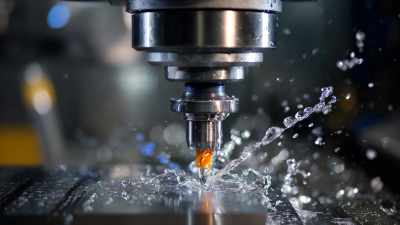
- sales@bjbod.com
- Mon - Sat at 7:00AM to 9:00PM

In today's fast-paced manufacturing environment, optimizing efficiency is crucial for staying competitive. One of the most effective ways to achieve this is by investing in a CNC machine. With its precision, automation, and ability to handle complex designs, a CNC machine enhances production workflows and minimizes human error. This technology not only streamlines the manufacturing process but also significantly reduces operating costs and turnaround times. As industries continuously evolve and the demand for high-quality products increases, incorporating a CNC machine into your operations can be a game changer. In this guide, we will explore the transformative impact of CNC machining on manufacturing efficiency, highlighting the key benefits and considerations for businesses looking to make this important investment.

 The integration of CNC machines into manufacturing processes can significantly enhance efficiency and output. CNC, or Computer Numerical Control, allows for high precision and automation in production, which means less time spent on manual labor and reduced risk of human error. By streamlining operations through automation, manufacturers can produce parts faster and with greater accuracy, resulting in higher quality products and reduced waste.
The integration of CNC machines into manufacturing processes can significantly enhance efficiency and output. CNC, or Computer Numerical Control, allows for high precision and automation in production, which means less time spent on manual labor and reduced risk of human error. By streamlining operations through automation, manufacturers can produce parts faster and with greater accuracy, resulting in higher quality products and reduced waste.
Tips for Maximizing CNC Efficiency: First, ensure that your CNC program is optimized for the specific materials you are working with. Fine-tuning feed rates and tool paths can lead to better cutting results and prolong the life of your tools. Second, invest in regular maintenance for your CNC machines to avoid costly downtime. Scheduled check-ups can prevent small issues from becoming major breakdowns, ensuring a smooth production flow.
Additionally, consider training your staff to effectively utilize CNC technology. Well-educated operators can fully harness the machine's capabilities, allowing for quicker adjustments and problem-solving during the production process. Embracing CNC technology not only improves manufacturing efficiency but also positions businesses to adapt to market demands swiftly.
CNC technology has revolutionized the manufacturing landscape by significantly enhancing precision and quality control. Unlike traditional machining methods, CNC (Computer Numerical Control) machines operate using computer programs to dictate the movements and operations of tools. This automation allows for intricate designs that would be nearly impossible to achieve manually. The result is a remarkable level of accuracy, reducing the margin for error and ensuring that each component is produced to stringent specifications.
Moreover, the integration of CNC machines into manufacturing processes facilitates consistent quality control. With features such as real-time monitoring and data collection, manufacturers can track performance and identify deviations from set parameters. This leads to immediate corrective actions, minimizing waste and increasing overall production efficiency. By investing in CNC technology, manufacturers not only enhance their operational capabilities but also build a reputation for high-quality products, which is vital in today’s competitive market.
Investing in CNC machines has become imperative for manufacturers looking to enhance their operational efficiency and profitability. Automated CNC systems are designed to streamline production processes, drastically reducing the time and effort involved in machining components. By minimizing manual labor and increasing precision, companies can produce high-quality products consistently and at a faster pace. This transformation leads to significant cost savings as overhead expenses are lowered and the potential for human error is mitigated.
According to a market research study, the global demand for CNC metalworking is on the rise, fueled by the need for cost-effective manufacturing solutions. Automated CNC systems not only reduce labor costs but also minimize waste and rework, leading to improved profit margins. As efficiency increases, manufacturers can better meet consumer demand without the burden of escalating operational costs. Such advantages underscore the importance of adopting CNC technology in today's competitive market, where businesses must continuously innovate to stay ahead.
| Dimension | Before CNC Investment | After CNC Investment |
|---|---|---|
| Production Time (Hours/Week) | 40 | 25 |
| Labor Costs ($/Week) | 2000 | 1200 |
| Error Rate (%) | 5 | 1 |
| Material Waste (%) | 15 | 5 |
| Weekly Output (Units) | 100 | 150 |
| Profit Margin (%) | 20 | 35 |
Investing in CNC (Computer Numerical Control) machinery offers unparalleled scalability and flexibility, allowing manufacturers to adapt to shifting market demands swiftly. According to a report by MarketsandMarkets, the global CNC machine market is projected to grow from $75 billion in 2021 to over $100 billion by 2026, driven in part by the increasing need for customized production solutions. This growth highlights how CNC machines provide the adaptability required to meet varying customer specifications while maintaining high precision and efficiency.

Moreover, data from Statista indicates that over 50% of manufacturers recognize that CNC technology enhances their capacity to scale operations. With the ability to switch between different product designs in minimal time, manufacturers can respond to changes in consumer preferences or emerging market trends without significant downtime. This agility not only maximizes productivity but also allows companies to reduce lead times, ensuring they remain competitive in an ever-evolving marketplace. As a result, investing in CNC machinery is not just a technological upgrade; it's a strategic move to enhance operational versatility and responsiveness.
Integrating CNC machines into existing workflows can significantly enhance manufacturing efficiency by streamlining production processes and reducing lead times. By automating tasks that were traditionally manual, businesses can minimize human error and maximize precision. This not only increases output but also improves the overall quality of products. Proper integration ensures that CNC machines complement existing equipment, allowing for a seamless transition that maintains productivity levels.
**Tip:** Conduct a thorough assessment of your current workflows before integrating CNC technology. Identify bottlenecks and areas where CNC can provide the most benefit, ensuring that the transition enhances operational efficiency.
Moreover, training staff to work with CNC machines is crucial for successful integration. Employees should understand how to operate the machines and leverage their full capabilities. By fostering a culture of continuous learning, manufacturers can adapt quickly to new technologies, leading to ongoing improvements in efficiency.
**Tip:** Implement regular training sessions and encourage knowledge sharing among team members. This can help in troubleshooting issues quickly and enable innovative uses of CNC technology within the workflow.





